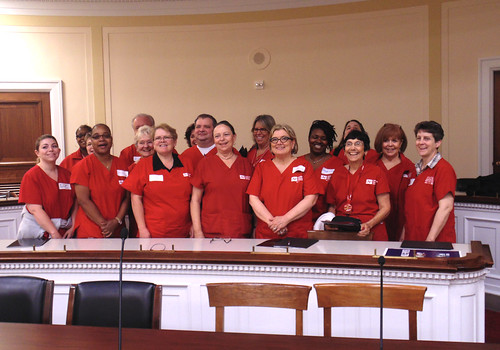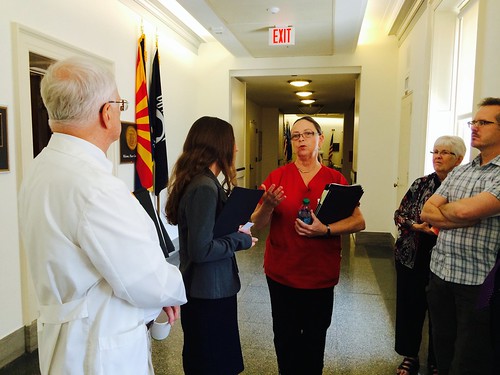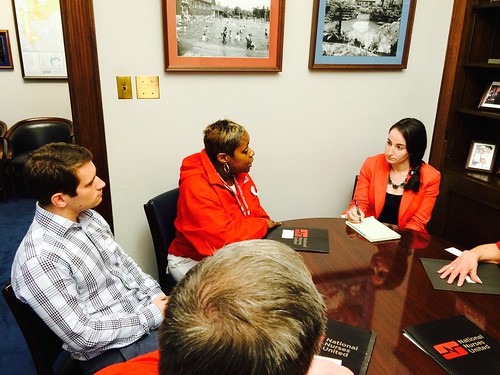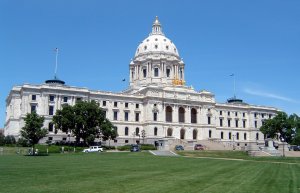Author Archives: Editor
Nurses Take Campaign to Heal America to Congress
Registered nurses from across the country went to Washington DC last week to urge Congress to take action to fix the nation’s broken health care system by enacting Medicare for All.

RNs from California, Florida, Illinois, Kansas, Maine, Maryland, Massachusetts, Michigan, Minnesota, Texas and Washington DC urged Congress to enact Medicare for All.
While our nation’s health care system has incredibly capable nurses and other health professionals, and boasts a variety of other advantages like the highest spending per person in the world, we don’t get the outcomes we should. Far too many go without health care when they need it. Our nation ranks behind 19 industrialized countries in preventable deaths among those under age 75.
In our for-profit health care system, too often patients’ needs seem to take a back seat to corporations’ efforts to build their bottom line. 42,000 Americans will die this year for lack of health coverage, or about 1 per 1,000 uninsured people. Nurses know all too well that patients face financial barriers to care – even with insurance. Over one-third of people report going without care or not filling a prescription due to cost, which is dangerous and can lead to unnecessary suffering, dramatically increased costs of care, and even death. Paul Holland, a nurse working at St. Louis University Hospital told staff for Senator Claire McCaskill (D-MO) about one patient who was forced to put off necessary treatment until she qualified for Medicare years later, which may well have led to her death.

NNU Co-President Deborah Burger, RN, and other health care advocates made the case for Medicare for All to staff for Rep. Raul Grijalva (D-AZ).
These are among the reasons that National Nurses United advocates for Medicare for All. Nurses envision a more equitable world, where patients get the care they need without going broke. As part of the Nurses Campaign to Heal America, RNs went to Capitol Hill in Washington DC last Thursday to tell members of Congress that our patients need a system that puts them first.
Working with health care and consumer advocates, we visited dozens of Senators and Representatives of both political parties to tell them that the nation needs a change. Vikki Averegan and Sylvia Nell Searfross of Texas had a great conversation in the office of Rep. Beto O’Rourke (D-TX) that produced concrete suggestions from the congressman’s staff to help make that change possible – they suggested we continue our activism and speak up for better health care at town halls and by writing letters.
Under a single payer health care system, everyone can get the care they need while the nation saves nearly $600 billion per year by slashing overhead and negotiating lower drug costs with providers. Beyond financial savings, streamlining the payment system would free up substantial nurse time and other health care professional time that could be spent caring for patients.
Two thirds of Americans support a national health program that covers everyone, and nurses were proud to speak up for this important step toward a health care system that puts the needs of patients first.

RN Kim Anderson of Chicago and a team of Illinois nurses urged staff for Rep. Mike Quigley (D-IL) to support Medicare for All.
Nurses also joined Sen. Bernie Sanders (I-VT) for a conversation about single-payer, improved Medicare for All at a summit with advocates Wednesday. We discussed how our health care system needs more than tinkering, that it needs an overhaul so that it enhances the clinical judgment of RNs and doctors and other caregivers in order to serves patients effectively. As patient advocates we can create a health care system offering universal access. We discussed how nurses and others reject a system where access is based on ability to pay, so are continuing our efforts to ensure that everyone gets the care they need.
A Travel Nurse Volunteer in Liberia: Simple Acts of Kindness
The Gypsy Nurse is heading to Liberia with Cross Cultural Care As you probably already read, The Gypsy Nurse is volunteering in Liberia. I plan to bring you along with me; virtually and give you a ‘feet on the ground’ accounting of the entire process. CHECK OUT THE PREVIOUS SEGMENTS OF THIS SERIES IF YOU WOULD LIKE TO […]
The post A Travel Nurse Volunteer in Liberia: Simple Acts of Kindness appeared first on The Gypsy Nurse.
Nurses Must Have Chance for Input on School Decisions Affecting Nursing Responsibilities, California Court Rules
NINR Welcomes Three New Members to the National Advisory Council for Nursing Research
Memorial Day- Thanking Our Country’s Military
A Day of Remembrance “Memorial Day is a US federal holiday which is celebrated every year on the final Monday of May.[1] Memorial Day is a day of remembering the men and women who died while serving in the United States Armed Forces.[2] Formerly known as Decoration Day, it originated after the American Civil War to commemorate the Union andConfederate soldiers who died in the Civil War. […]
The post Memorial Day- Thanking Our Country’s Military appeared first on The Gypsy Nurse.
Ask a Travel Nurse: How do you handle licensing in different states when travel nursing?
Ask a Travel Nurse Question:
How do you get so many licenses when travel nursing? Are they all compact states? Don’t you have to have a home base to even apply for your first assignment and/or license?
Ask a Travel Nurse Answer:
If you do not already reside in a compact state, then you will have to obtain a license for each state in which you want to practice. However, many travel companies will reimburse for this cost, but you may need to obtain the license yourself, even before you start to look, because of some of the long turn-around times with the state boards.
Just check with your recruiter and make sure the company will reimburse you if you do end up taking an assignment with them, in the state in which you obtained the license.
I have never encountered anyone who did not have a license active in at least one state and although I do not know if it is strictly mandatory, I would think that you would want to carry at least one active license to show that you have passed the NCLEX and are able to work as a registered nurse.
Hope this helps.
David
Thank You, Military Nurses!
With Memorial Day weekend on the horizon, Travel Nursing Blogs would like to say thank you, military nurses!
Perhaps the ultimate in a very serious, long-term Travel Nursing assignment, nurses in the military do their part for their patients and for all of us. Just like all nurses, their hard work is unparalleled, and with the extra badge of honor that comes with service to their country come additional sacrifices.
From very early on in American history there were always nurses right alongside soldiers, helping treat patient soldiers, civilians, and risking their own safety while they were at it. In 1901, the Army Nurse Corps was established and made military nurses official. The Navy Nurse Corps followed in 1908 and the Air Force Nurse Corps was established next in 1949.
For more info on the history of military nurses and the army nurse corps, click here.
Thank you, military nurses! We salute you this Memorial Day, and every day.
MNA Legislative Wrap-up May 23, 2014
The 2014 session of the Minnesota Legislature was a success for nurses and working families. Minnesota’s growing economy produced a $1.2 billion budget surplus in 2014, allowing Governor Dayton and the legislature to deliver middle class tax relief and new investments in our schools and our economy.
Minnesotans have seen remarkable progress over the past two years following some of the most productive, efficient legislative sessions in recent memory. Much of that progress will affect patients, working families and nurses.
Health and Human Services Policy Omnibus Bill: Signed into Law
The Governor signed the package of health policy bills (HF2402) into law. Several MNA priorities were included in the bill.
- Health Professionals Services Program (HPSP):
o Requires health licensing boards to temporarily suspend a health professional license for 30 days and complete a disciplinary investigation during that time, if they receive a report from HPSP that the regulated person has engaged in conduct that might cause risk to the public and the board has probable cause to believe their continued practice presents an imminent risk of harm to the public.
o Allows the 30 day temporary suspension to be lifted if the board does not complete their investigation by then, unless the regulated person requests a delay.
o Requires all health licensing boards to stay in HPSPS until July 1, 2015.
o Requires employers to report any knowledge of drug diversion by a regulated health professional to that persons licensing board unless the knowledge was obtained in the course of a professional-patient relationship or because of the person’s participation in HPSP.
o MNA supported this legislation to protect patient safety and to protect the privacy and health of nurses with substance use disorder who are working to preserve their licenses and careers.
- E-cigarettes:
o Bans the sale of e-cigarettes from kiosks and vending machines.
o Requires child-resistant packaging to prevent the dangerous ingestion of nicotine by children.
o Bans the use of e-cigarettes in publicly-owned buildings.
o Local communities can implement more restrictive regulations on e-cigarettes if they wish.
o MNA supports restrictions on e-cigarettes since the long term health effects are unknown.
Public Employment Relations Board: Signed into Law
On May 9th, the Governor signed into law a bill to establish a Public Employment Relations Board (HF3014). This legislation will create a board to decide Unfair Labor Practice (ULP) claims involving public employees, which includes many MNA nurses at public municipal or county hospitals (known in statute as Charitable Hospitals). Under current law, public employers and employees must litigate ULP claims in district court-a cumbersome and expensive process. MNA supported this bill because the PERB will create a process that saves employers and employees money and would mirror the ULP process in the private sector.
APRN Bill: Signed into Law
Governor Dayton signed into law a bill to allow Advance Practice Registered Nurses to practice to the full extent of their scope (SF511). The law gives full practice authority to Certified Nurse Midwives, Certified Registered Nurse Anesthetists, Nurse Practitioners and Clinical Nurse Specialists. Beginning January 1, 2015, APRNs will be able to practice independently. The new law limits, however, CRNA’s who will continue to require a collaborative management agreement with a physician to practice pain management.
This law represents years of work by advocates for APRNs, and MNA was proud to support this effort.
Steve’s Law: Signed into Law
Governor Dayton signed into law a bill to broaden the availability of Naloxone (Narcan) for first responders to use in cases of opiate overdose (SF1900). The bill received near unanimous support along every stage of the legislative process. Members of both parties spoke eloquently about the disease of addiction and the great promise this bill has to save lives and give individuals suffering with substance use disorders a second chance. MNA proudly supports this bill, and we applaud the chief authors, Rep. Dan Schoen and MNA member Sen. Chris Eaton, for their work on this common-sense, live-saving legislation.
Medical Cannabis: Awaiting Governor’s Signature
Sen. Scott Dibble and Rep. Carly Melin, the authors of different bills to legalize medical marijuana, announced they had come to an agreement based on the House version of the bill, but with some changes that broaden access, while tightening restrictions to prevent misuse.
This bill will be the strictest and most regulated medical cannabis law in the country. Only patients with qualifying conditions such as cancer, HIV/AIDS, and seizures will be eligible. It does not allow smoking of marijuana. Instead, patients can access approved forms of medical cannabis such as liquid, pill, or vapor. The bill creates a patient registry to monitor the use of prescription cannabis as well as to evaluate the health effects. Governor Dayton has said he will sign the bill next week.
MNA supports legislation that would provide compassionate relief to seriously ill patients.
Budget Issues: Signed into Law
The Governor signed the Omnibus Supplemental Budget bill into law. There are several portions of the bill that will directly affect MNA members. Highlights of Health and Human Services portion:
- Fully funded 5% rate increase for Home and Community Based Services Providers of which 80% is encumbered to go to employees in the form of wages and benefits.
- Increased funding for mental health crisis intervention services.
- Funding of State Operated Services and Minnesota Sex Offender Program salary supplement. The Governor had requested $11 million each year for 2015, 2016, and 2017 for a total of $33 million to maintain current salary agreements with employees of SOS and MSOP. The conference committee funded everything fully, except for the $1 million for MSOP in 2016 and $1 million for MSOP in 2017. They also fully funded the Governor’s recommendation for court ordered expert reviews at MSOP of $3 million in 2015.
- $75,000 for a health care workforce study. MNA will work to ensure that nurses are included in this study.
- The study on chronic pain therapy treatment included in the APRN bill was funded at $75,000 for 2015.
Construction Projects: Signed into Law
The Capital Investment Bonding bill to fund construction projects included several MNA priorities. Highlights include:
- $56.3 million for design, construction and remodeling of the Minnesota Security Hospital in St. Peter.
- $7.4 million for design and remodeling of the Minnesota Sex Offender facility in St. Peter.
- $2 million in asset preservation for veterans homes and memorials.
- $18 million for a new health services intake at St. Cloud correctional facility.
Minimum Wage: Signed into Law
For the first time in a decade, Minnesota’s minimum wage is set to increase. An estimated 325,000 hard-working Minnesotans will get a raise to $9.50 by 2016 (HF2091). The minimum wage will be indexed to inflation in 2018 to keep up with the cost of living. MNA supported this effort because poverty is a public health as well as an economic issue.
Synthetic Drugs: Signed into Law
The Governor signed a bill prohibiting the sale of synthetic drugsinto law. MNA members actively advocated for tougher prohibitions on synthetic drugs and were vocal supporters of the bill. We thank Representative Eric Simonson for considering MNA’s input as he worked to protect both the public and medical personnel affected by those under the influence of synthetic drugs.
Women’s Economic Security Act: Signed into Law
The Governor signed into law the Women’s Economic Security Act(WESA) on Mother’s Day. The WESA is the most significant women’s rights legislation in years.
The Women’s Economic Security Act:
- Allows mothers to stay in the workforce by expanding family leave and providing reasonable accommodations for pregnant and nursing employees.
- Decreases the gender pay gap through the participation of women in high-wage, high-demand occupations in fields such as science, technology, engineering, and math (STEM).
- Decreases the gender pay gap by reducing the “motherhood penalty” by requiring equal employment treatment regardless of “familial status.”
- Addresses negative economic consequences of domestic violence, stalking, and sexual assault.
- Enhances retirement security by considering a state retirement savings plan for those without an employer-provided option.
MNA supported this legislation.


